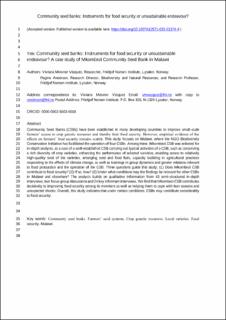Community seed banks: Instruments for food security or unsustainable endeavour? A case study of Mkombezi Community Seed Bank in Malawi
Abstract
Community Seed Banks (CSBs) have been established in many developing countries to improve small-scale farmers’ access to crop genetic resources and thereby their food security. However, empirical evidence of the effects on farmers’ food security remains scarce. This study focuses on Malawi, where the NGO Biodiversity Conservation Initiative has facilitated the operation of four CSBs. Among these, Mkombezi CSB was selected for in-depth analysis, as a case of a well-established CSB carrying out typical activities of a CSB, such as conserving a rich diversity of crop varieties, enhancing the performance of selected varieties, enabling access to relatively high-quality seed of the varieties, arranging seed and food fairs, capacity building in agricultural practices responding to the effects of climate change, as well as trainings in group dynamics and gender relations relevant to food production and the operation of the CSB. Three questions guide this study: (1) Does Mkombezi CSB contribute to food security? (2) If so, how? (3) Under what conditions may the findings be relevant for other CSBs in Malawi and elsewhere? The analysis builds on qualitative information from 43 semi-structured in-depth interviews, two focus-group discussions and 24 key informant interviews. We find that Mkombezi CSB contributes decisively to improving food security among its members as well as helping them to cope with lean seasons and unexpected shocks. Overall, this study indicates that under certain conditions, CSBs may contribute considerably to food security. Community seed banks: Instruments for food security or unsustainable endeavour? A case study of Mkombezi Community Seed Bank in Malawi
